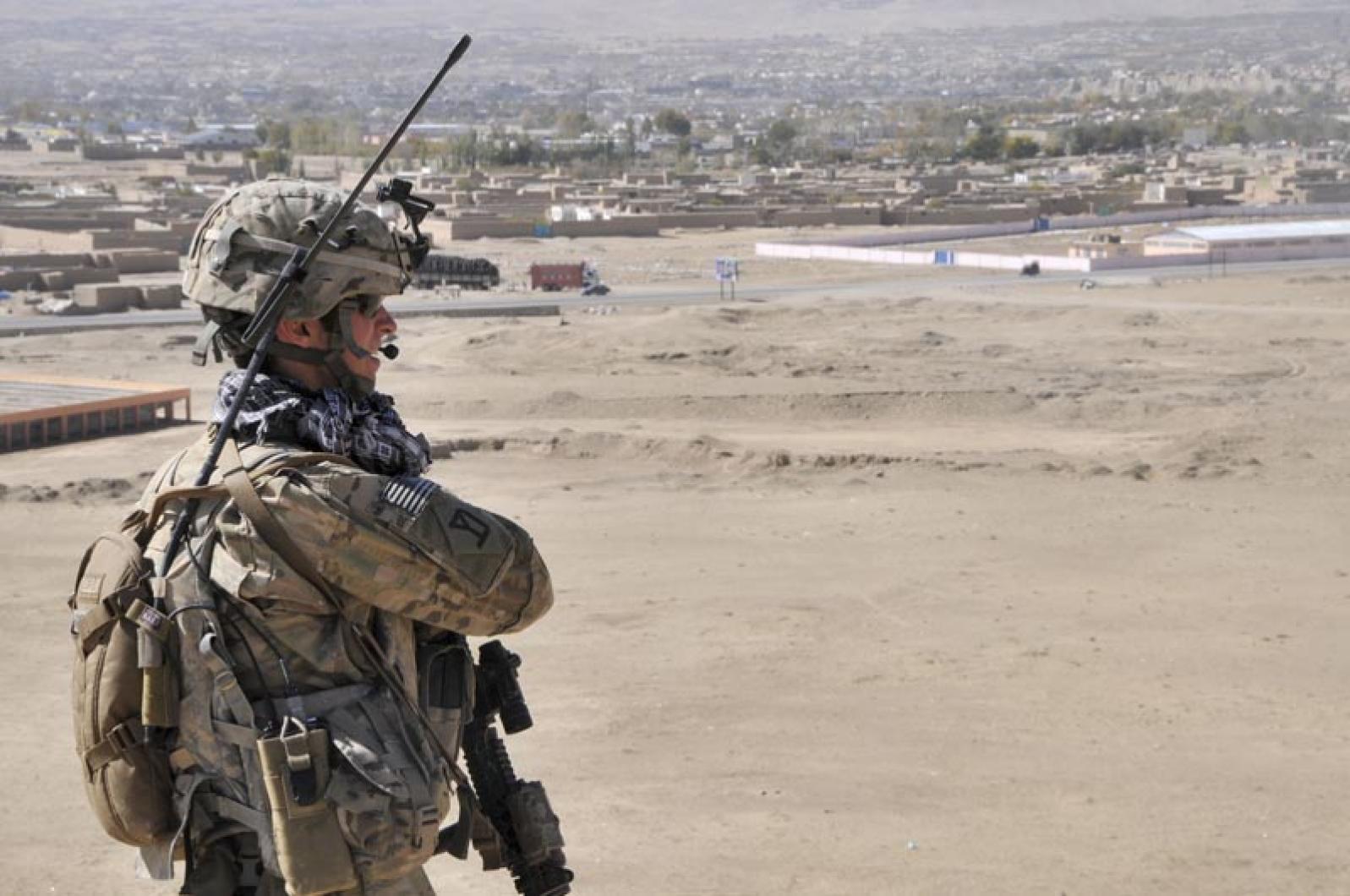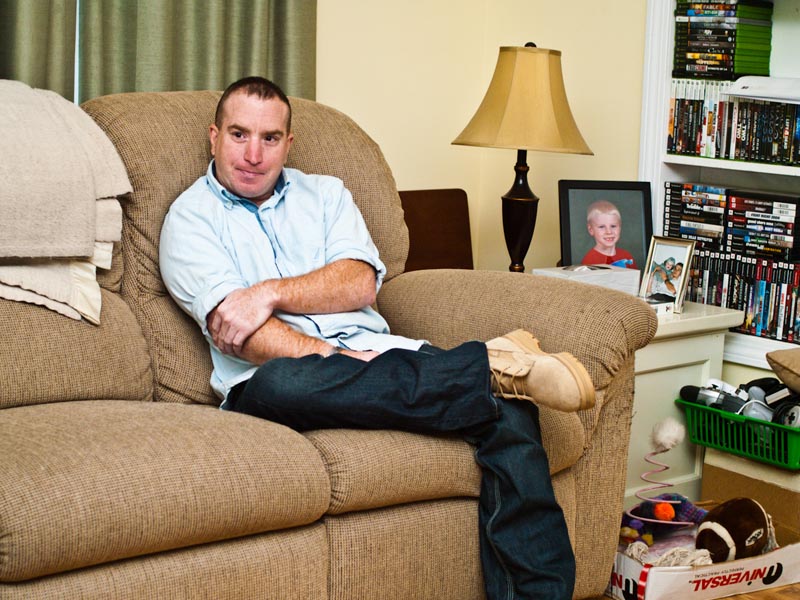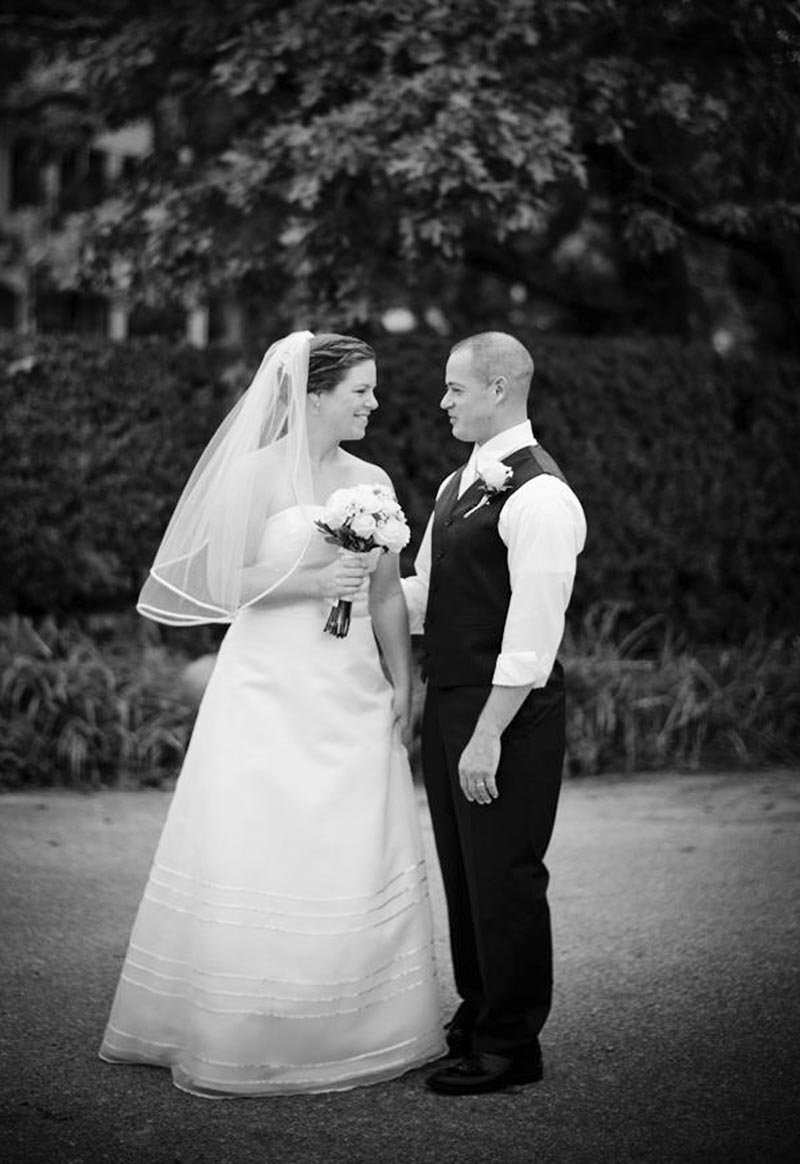One rock was out of place. Staff Sgt. Randy Dull had traveled the same route in provincial Afghanistan one week prior, but something was amiss. “The big thing about keeping the same crew is you learn the terrain — you know every inch,” Mr. Dull said in an interview with the Gazette this week at his Edgartown home. “We were going 45 miles per hour and my gunner noticed a rock that was out of place . . . we called the convoy to a halt.”
“Just that rock was an indicator that about 50 metres up there was a 250-pound IED [improvised explosive devise] sitting in a culvert,” he recalled. “That can be hair-raising.”
Mr. Dull, 32, returned to the Vineyard in April. He’s been on three tours with the National Guard, two in Iraq and one in Afghanistan.
“I don’t count Kosovo,” he said. “I joke about it, but it’s the one place I didn’t get shot at.”
Mr. Dull was a member of the provincial reconstruction team this past tour, working with military and civilian organizations to build better governments. His job was to protect essential personnel.
On an Island where upwards of 100 Vineyarders have traveled overseas to fight in the Iraq and Afghanistan wars, stories like Mr. Dull’s have become more prevalent in recent years. Nationwide during the last decade, over two million soldiers have been deployed, with 68,000 troops still serving in Afghanistan.
Dukes County veterans services agent JoAnn Murphy said help for Iraq and Afghanistan soldiers is far greater than previous wars. Veterans Affairs meets returning soldiers and organizes a family day at a military base before the soldiers make their final trip home. Providing information to both soldiers and families helps ensure that they are prepared for any post traumatic distress symptoms or re-entry issues, Ms. Murphy said.
The Iraq and Afghanistan wars are different than previous military operations because “everyone that goes over there is in harm’s way,” she said.
“These guys over there, no matter what their job is, you’re still potentially in harm’s way,” she said. “There’s more chance of people getting hurt and having PTSD.”
Mr. Dull frequently attends a meeting on the Island organized by Veterans Affairs.
“They’ve got a great veterans group that I’ve gone to before and been going back to again,” he said. “It’s not my first rodeo but...there are a bunch of veterans, so I’ll only talk about certain things there. You get great advice on how to deal with stuff.”
Mr. Dull described the justice system in Afghanistan as lopsided. He remembered one woman who was about 18, serving a life sentence because she was raped.
“For us, it’s like, are you kidding me?” he said. “[The Taliban] is hindering any form of freedom. They target people indiscriminately.”
He continued: “We had a doctor in our area who had worked with us, but he would treat both Taliban and locals. We asked him why, and he said, ‘Your president said you’re leaving in 2014, if I help you more than them, as soon as you guys leave they’re going to kill me.”
War is always in the back of his mind, he said, and Mr. Dull finds himself asking how much of an impact did he truly make? But having helped to build hospitals, schools and public safety buildings comforts him.
Living with his best friend and godson has made the adjustment easier. He’s still part of the National Guard, with three years left on his contract and is likely to re-enlist for another six years after that.
“The best thing about the Island . . . is they don’t judge,” he said. “I’ve never been judged.”
Matt Bradley, 32, returned home to West Tisbury from his first tour in Afghanistan last March. His four-month stint in Afghanistan with the Marine Corps as a medic was preceded by a tour in Iraq.
An EMT since 1999, Mr. Bradley worked with Edgartown, Tri-Town and Oak Bluffs ambulance services before deciding to join the military at the age of 25. Mr. Bradley was coming off a 24-hour shift at the Oak Bluffs fire station on Tuesday morning, one of two he works per week. He also works part-time at Vineyard Pool and Spa.
“Coming back was better this time,” he said in the break room at the fire station. “I was on a big, well-established base, everything was routine. We went out every day outside the wire but went to the chow hall most nights...they were building a coffee shop by the time I left.”
Small things like going to the grocery store and being able to drive have added to the pleasures of being back home. Mr. Bradley was the recipient of a youth lot at the Middle Line Road affordable housing development in Chilmark. He signed his mortgage this week. He’s enjoyed returning to the simpler life, but is still actively involved in training operations with the Marine Corps.
“I love to tell the guys when they ask me, ‘what do you do on the outside doc?’ I clean pools,” he laughed.
Mr. Bradley was a section foreman in Afghanistan, in charge of 22 other soldiers. While stationed in Iraq, he was an advisor to Iraqi police. By the time he left, Mr. Bradley was advising 200 to 300 Iraq police.
Culture differences were a great challenge in Afghanistan and Iraq. One day while he was stationed on radio watch at the base, an Iraqi father brought his two boys to the base, looking for medical help.
“They called them scrapers — they would jump the fence and into the practice ranges and pick up scrap metal,” Mr. Bradley said. The boys had been injured by shrapnel, “because the grenade they [the soldiers] had used for practice had gone off when they were picking up metal. I said, you know your kid isn’t going to live long if you keep doing this. And he said, ‘well I’ve already lost one. I have to make a living.’”
“There’s only so much I could do,” Mr. Bradley said. “They didn’t understand that we can’t solve all of the world’s problems.”
Whitney Hyde, 25, returned home to West Tisbury in early April after a nine-month tour in Afghanistan. He was stationed in the Ghazni Province, working security for one of the provincial reconstruction teams. Mr. Hyde is completing his bachelor's degree in philosophy at the University of Massachusetts in Amherst, which he began before his deployment.
“I don’t think I’ve had as hard a time adjusting, but I have a different perspective on things,” he said on the telephone between classes this week. “It’s more of a concept of how things can always be worse.”
The wars are no longer in the forefront of people’s minds, “which is understandable but no less tragic,” he said. “ We’ve been over there for over a decade. There are kids over there now who were four or five years old when everything started and barely remember why we were over there in the first place.”
“It’s tragic how it’s fallen to the back burner like it has because it’s the closet thing to justified conflict we’ve been in for a while.”
Mr. Hyde said it is still difficult to describe life after war.
“It sucks being over there sometimes and it’s hard, but there are other parts you miss about it,” he said. “Everyday life doesn’t satisfy as much...it’s hard to pin down exactly what those things are but you definitely come away with certain longings. I’m in no rush to go back, but at times I miss being over there.” “It has a significant impact on things for sure — it’s life or death,” he continued. “When there are people right outside your backyard that want you dead, it makes you value things a little bit differently. And you kind of lose touch with that value being back. Everything here is so easy and slipping right back into the swing of things.”
It’s muscle memory more than anything else that causes him and many veterans to tense up around loud noises, Mr. Hyde said.
“Pretty much anyone is going to come away with that, but you begin to get used to it,” he said. “The perspective you come away with tends to clash with how people back here don’t value the same things. It’s definitely a necessary part of how we live our lives and it’s a necessary part of our country, which is something I feel like a lot of people on the Island want to ignore...it’s so secluded and so different from things, it’s easy to lose sight of things.”
His first summer back, Mr. Hyde worked as a traffic officer with the Chilmark police department in Menemsha.
“That was a change of pace,” he said of fielding complaints from tourists over parking.
For Mr. Hyde the military was always an option.
“It’s always been something in the back of my head,” said Mr. Hyde. “Every person at some point considers the military. Even if the answer is an immediate no, they’ve still asked the question. It came down to I didn’t want to look back on it and have it hanging over me.”
“I think it’s been a really positive impact on my life but it definitely has moments of difficulty,” he continued. “I’m glad I did it.”
Siobhan Healy, 31, grew up in Vineyard Haven and currently lives in New York city with her husband Bill and their five-month old son, Liam. In Iraq she managed airborne early warning systems and aircraft control, directing fighter pilots and bombers, and has since managed similar operations from New York.
“I love it, I absolutely love it,” she said. “It’s such a big responsibility and it’s so fast-paced, you really don’t have time to sit on your laurels.”
Ms. Healy stays in contact with her unit overseas, and has taken to mentoring some of the younger members of the unit.
“Some of them have never left home before, for them to go over there is an experience,” she said. “I’m sad I didn’t get to be there for them, but it sounds like they’re learning a lot.”
“It’s about the job,” she tells them. “Something is going on, you just don’t see it yet. Always do something outside of the job. I volunteered at the hospital . . . which was really stressful, but doing something outside of the job was important.”
She had a difficult time acclimating herself to civilian life, and like Mr. Hyde, had difficulty putting her feelings in words.
“I felt overwhelmed by television and computers and all of that, and not being able to verbalize, that was the hardest,” she said.
With help from the G.I. bill, Ms. Healy is now completing her second master’s degree at Long Island University in mental health. She hopes to put her experience from the military and her work with animal rescue groups toward working with veterans and animal therapy. Ms. Healy said people are always appreciative and respectful of her service, and she of her duty. “I’ve never felt put off by someone who thinks the war is wrong — I don’t have an opinion, I can’t, but I also don’t,” she said. “I joined the military to serve my country . . . the people voted for the president, and the president sent us over there, so in an essence I’m working for the people. I’ll continually support whatever decisions my commander in chief makes, regardless of my opinion.”







Comments
Comment policy »